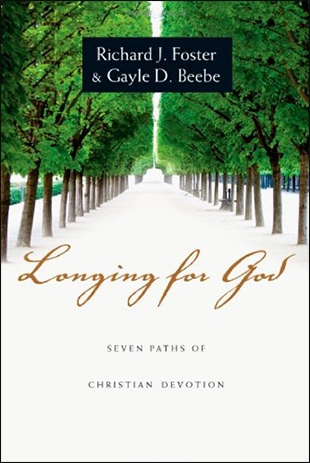Richard J. Foster is one of our Living Spiritual Teachers and the founder of Renovare in Denver, Colorado. Gayle D. Beebe, president of Westmont College, is one of the general editors of The Renovare Spiritual Formation Bible. Longing for God grew out of a course they developed called "The History and Practice of Christian Spirituality." It identifies seven primary paths to God and uses excerpts from key witnesses from the past to each one. The paths are:
1. The spiritual life as the right ordering of our love for God.
2. The spiritual life as journey.
3. The spiritual life as the recovery of knowledge of God lost in the Fall.
4. The spiritual life as intimacy with Jesus Christ.
5. The spiritual life as the right ordering of our experiences of God.
6. The spiritual life as action and contemplation.
7. The spiritual life as divine ascent.
Foster and Beebe acknowledge that there are other spiritual practices such as public and private worship, study, prayer, reading and memorizing Scripture, reflecting on God's activity in nature and history, service of others, solitude and silence, and fasting. But the ones covered in this book have the advocacy of the great Christian saints and classic writers and have been used wisely to activate spiritual maturity. In each chapter there are reflections on the Christian thinkers followed by "Reflecting and Responding" sections where Foster gives his take on the material along with a prayer.
We were especially taken with Blaise Pascal's definition of the human condition as animated by boredom, inconstancy, and anxiety. He sees us as both glorious and wretched. There is plenty to think about while reading Evagrius of Ponticus whose eight godly virtues (temperance, mildness, generosity, humility, chastity, diligence, and wisdom) are relevant to the contemporary scene. We agree with George Herbert's idea that beauty calls us to God, and we certainly support Francis of Assisi's joyful humility. We affirm St. Bonaventure's challenge for us to read "the "book of experience" and Thomas a Kempis' quest for inner peace as a priority of faith. We need more adult education programs in churches to explore what Julian of Norwich called "spiritual imagination" and what John Cassian saw as the mother of all virtues — discernment.
Foster and Beebe conclude: "The world cries out for a theology of spiritual growth that has proven to work in the midst of the harsh realities of daily life." They hope that this book will serve as a spark and a spur to those who have burnt themselves out in church work, social ministry, the fixed idea of spiritual formation as a form of works-righteousness, as well as those imprisoned in a faith that is mainly concerned with the afterlife and Heaven. Spiritual transformation through Jesus Christ and the Holy Spirit is a possibility, and the authors have provided us with many "shining models of holiness."
